|
Mendon — The Early Years
Stagecoach Hotels
by
Several years before her death on July 4, 2002, Dorothy Barben, a long-time
friend and country neighbor, gave me a number of photographs of scenes
associated with the farm owned by her husband Fred. The 141-acre farm,
located on the West Bloomfield Road between the hamlets of Mendon Centre
and Mendon, had been purchased in 1906 by Fred's father, Gottlieb Barben.
Known as the "Maple Grove" farm, the property was settled by
Samuel Miller who had moved to Mendon from Hartford, Connecticut, in 1807.
His early Greek Revival style house has been faithfully maintained over
the years and still exhibits the architectural features of the period
in which it was built.
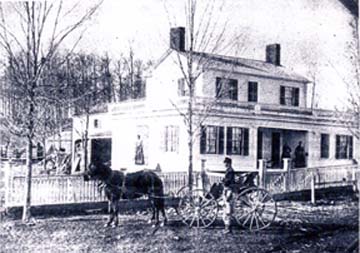
Gottlieb Barben standing by a buggy in front of the house
and farm that
he purchased from the estate of Samuel Miller in 1906.
(Photo courtesy of Dorothy Barben)
(Author's Note: For readers who are not familiar with the geography
of this area, "Mendon" is the name of a township as well as
the name of a hamlet within that township. This duplication of the name
sometimes caused confusion, even for residents of the community.)
Dorothy was born in 1915 on her family's farm near Mendon Centre, attended
District School Number 7 in the Centre, and lived there until her marriage.
She possessed an extensive knowledge of local history and I spent many
pleasant afternoons sitting at her kitchen table while she shared with
me her recollections of Mendon Centre people and events.
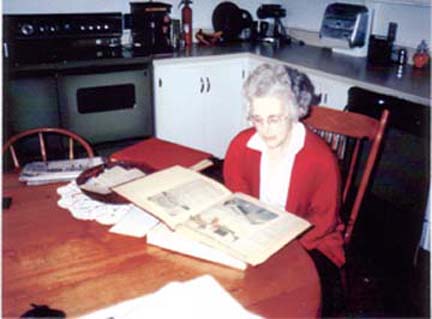
December 1993 photograph of Dorothy Barben at her kitchen
table
sharing her knowledge of Mendon Centre history with the author.
(Photo by John G. Sheret)
On October 15, 1951, Fred Barben expanded his farming operation by buying
a 97-acre farm a short distance down the road bordering the hamlet of
Mendon. Included in the purchase were a large cobblestone house and a
tenant house. He had no need for the two houses and, while cleaning out
the cobblestone prior to its sale, Mrs. Barben found an 1896 account book,
kept by a former owner of the farm, Thomas Finucane, listing
the various expenses associated with the construction of a barn in the
hamlet.
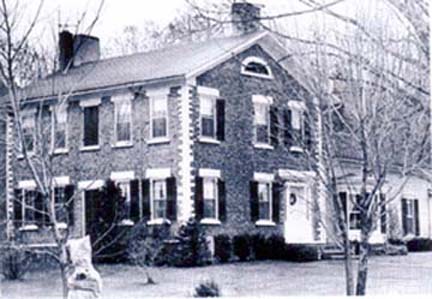
Cobblestone house in which Dorothy Barben found the 1896 account
book and the 1900 photograph of the stagecoach horse barn.
(Photo by John G. Sheret)
For many years Mr. Finucane was also the owner and proprietor
of the Cottage Hotel at the northeast corner of the Pittsford-Mendon Road
and the Mendon-Victor Road in the hamlet of Mendon. His hotel and the
Mendon Hotel on the opposite corner were stagecoach stops on the route
between Canandaigua and Rochester. As many as fourteen stagecoaches could
be counted in close proximity to the four corners as the passengers took
their refreshments at the hotels. Here the drivers changed horses for
the next leg of the trip called a stage which
was a section of road between relays of animals, usually ten to twelve
miles.
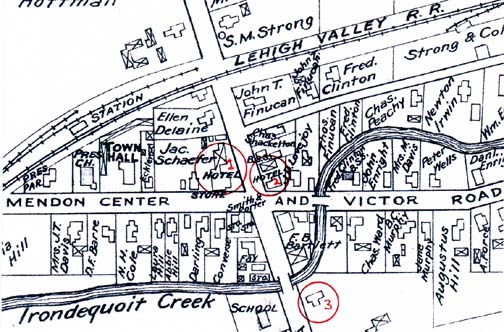
Map of hamlet of Mendon showing (1) Mendon
Hotel,
(2) Cottage Hotel, (3) Cobblestone house in which an account
book
and photograph of stagecoach horse barn were found.
(1902 Monroe County plat map)
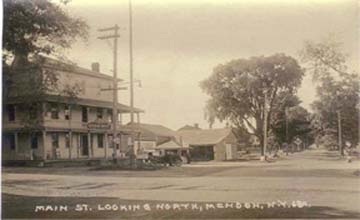
Mendon Hotel as depicted in a mid-to-late-1920's
postcard.
Lehigh Valley Railroad crossing can be seen in background.
(Author's collection)
On April 22, 1896, Mr. Finucane began the construction of a 30' x 44'
barn north of his hotel for the stabling of stagecoach horses. The barn
was completed on May 15th of that year at a total cost for materials and
labor of $407.91. His account book lists in detail every expenditure and
to whom he paid money for labor and materials. The totals for each category
were $99.45 for labor; $257.50 for lumber; $34.96 for digging and building
the foundation wall; and $16.00 for nails.
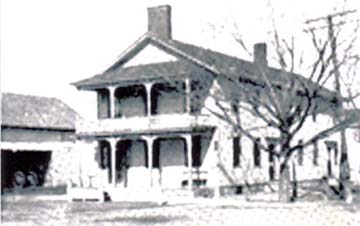
Cottage Hotel and stagecoach horse barn as they
appeared in a circa 1925 postcard. (Author's collection)
Another item of interest that Mrs. Barben found in the cobblestone house
was a photograph of the completed barn which appears to have been taken
from the second floor balcony of the Mendon Hotel across the street. Unfortunately,
the photo does not show the Cottage Hotel and only a shed
attached to the north side of the building appears in the picture. The
building to the left side of the barn is the blacksmith shop of R. L.
Johanson. The main-line tracks of the Lehigh Valley Railroad can be seen
in the far left background of the photo.
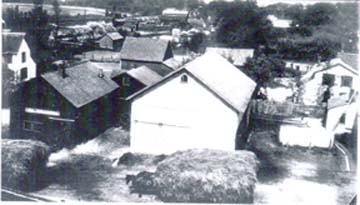
Photograph, dated 1900, showing newly constructed
stagecoach horse barn. (Photo courtesy of Dorothy Barben)
As I have previously discovered, exploring one incident in the history
of the Town of Mendon often leads to another related interesting event.
In 1777 the Marquis de Lafayette, a wealthy French aristocrat, purchased
a ship, and with a crew of adventurers, set sail for America to fight
in the revolution against the British. He joined the continental army
as a major general and was assigned to the staff of George Washington.
Serving with distinction, he led American forces to several victories,
including the Battle of Yorktown.
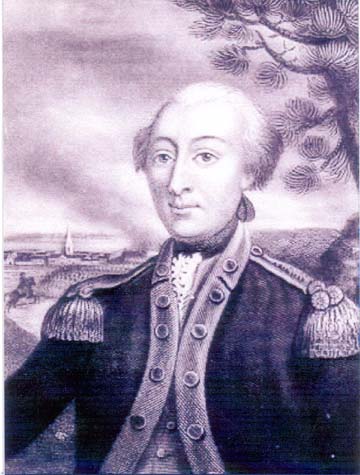
Undated portrait of the Marquis de Lafayette. (Source: earlyamerica.com)
In 1824, Lafayette returned to this country and began a tour of the twenty-four
states that then formed the Union. On June 7, 1825, traveling from the
west, he arrived in the Village of Rochesterville via the recently completed
Erie Canal. Following a grand reception in Rochester, he traveled in a
carriage owned by James K. Guernsey of Pittsford to the Phoenix Hotel
in that village.
From Pittsford he was driven to the Mendon Hotel where another carriage
waited to carry him to Canandaigua on his journey eastward. At the hotel
he dined in handsome style at a reception with many local people coming
to meet the distinguished visitor.
In 1983, the residents of the Town of Mendon celebrated the 150th anniversary
of the founding of the town. The following account of the Mendon Hotel
appeared in a history book published by the Town to celebrate the sesquicentennial
event.
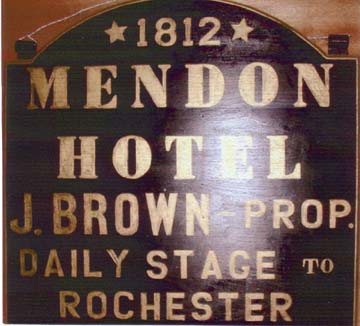
Photograph of sign that may be either a reproduction or paint
over.
The former Mendon Hotel, built around 1812, was in its halcyon
days a "handsome structure" from a description by an old
resident, and the center for numerous events interwoven with community
life. The Tomlinsons ran the hotel and then the Jacob Schafers purchased
it in 1890. It was during this period that the hotel was at the
height of its popularity. Traveling men stopped here, stagecoaches
arrived with passengers, and local folk assembled for the dances
held in the third-floor ballroom. There was lively music from an
orchestra consisting of a parlor organ and two violins. There were
dressing rooms where the ladies arriving in carriages changed from
traveling attire to party dresses. Men changed outfits, too. The
midnight suppers were bountiful, and the dancers trouped down the
long stairs when supper was ready. Prominent folk from miles around
arrived with horses and carriages for these functions.

This December 17th "Select" Party
at the Mendon Hotel was
most likely held in the 1890's. (Collection of John G. Sheret)
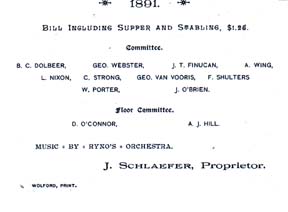
In 1891 you could buy your supper and stable
your horse for
$1.25 at the Mendon Hotel. (Collection of John G. Sheret)
Shortly after World War II with the great increase in the ownership of
automobiles and the discontinuance of passenger service on the Lehigh
Valley Railroad, the Mendon Hotel closed its doors forever. The building
stood empty and neglected until 1957 when it was demolished and a Gulf
service station was constructed on the site. Fortunately its neighbor,
the Cottage Hotel, although greatly altered from its original appearance,
still stands and today operates as a popular bar and restuarant. The barn,
built by Thomas Finucane in 1896 as a stable for stagecoach horses, also
remains as a symbol of an earlier time in the history of the Town of Mendon.
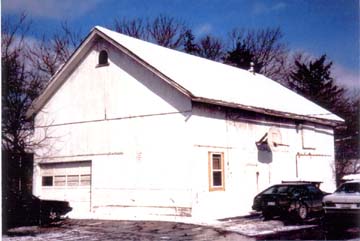
March 1994 photograph of the stagecoach horse barn built by
Thomas Finucane in 1896. (Photo by John G. Sheret)
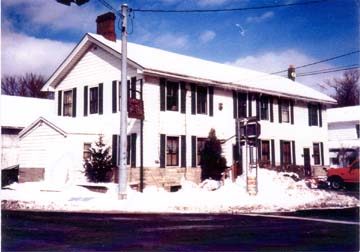
March 1994 photograph of the Cottage Hotel. (Photo by John G.
Sheret)
Sources of Information
Dorothy Barben
Rochester Historical Society
1983 Mendon Sesquicentennial History Book
Internet: earlyamerica.com
|



